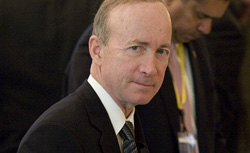Could Mitch Have Made It?
Mitch Daniels considers the doom of his presidential campaign.
Gov. Mitch Daniels of Indiana can imagine the death of the presidential campaign he decided not to launch. In the Republican debate held in Ames, Iowa, in August, candidates were asked to raise their hands if they would oppose a long-term budget deal that included a 10-to-1 ratio of spending cuts to tax increases. They all did (and Rick Perry, who wasn't yet in the race, later affirmed that he would have joined them). In an interview for CBS, I asked Daniels what he would have done. "I would not have raised my hand," he said.
If Daniels were a candidate, his campaign would have tested the proposition that a truth-telling contender can survive a party's nominating process. That is the thesis of Daniels' new book Keeping the Republic: Saving America by Trusting Americans: Politicians should level with voters, and voters can handle it. It's also the theory animating the fantasy-league Republicans who keep trying to encourage governors like Chris Christie of New Jersey to join the party's presidential race. If only one of these authentic characters who tells it like it is would emerge, the theory goes, voters would swarm to them and Obama would be trounced.
Daniels is not promoting increasing taxes. But he is flirting with lending some perspective to the presidential race—or at least an ounce of consideration. "Here's what I would have said, and I wish somebody would have said," he says. "I would have said, not 'I'll take the deal', but 'tell me more.'" He is highly suspicious of tax increases, and the tests he would apply are stringent. But Daniels is obsessed with the size of the debt and the looming catastrophe that will occur if it is not addressed. "We ought to view it as a military threat," he says. In order to start solving the problem, he is willing to trade progress on the big goal for ideological rigidity. "It would be a mistake the close the door. We need the 90 percent imaginary or hypothetical spending cuts here. We need that desperately, and I'd be willing up to some point to pay a price, if it were practical, to secure it."
Daniels has been joking with those who urged him to run that he might have killed his campaign in his first debate. "It would have been my boom moment," he says of not raising his hand. He knows from experience. When Daniels suggested Republicans should downplay social issues in order to stay focused on the deficit and not turn off independent voters, he was thoroughly criticized.
Still, he argues in his new book and in interviews that voters are ready to hear the truth about the country's serious fiscal condition and can handle a debate about the hard choices required. Wait, if his campaign would have been doomed, how can he be so sure people are ready to hear the truth? What Daniels says is required is a candidate who is willing to take the risk and fight past the political mercenaries who, Daniels says, have degraded political discourse. "You either believe the American people have the capacity to run their own lives and their government or you don't."
Daniels hasn't seen such a strategy yet in the current field, he says, though he thinks one of the current candidates can get there. What he's seen so far is that candidates are competing as if they are merely the "default option" for a country that doesn't like President Obama. The problem with this approach, argues Daniels, is that candidates are not using the campaign to build a mandate for action once they take office.
Daniels and Christie (so far) have resisted the entreaties to join the GOP race. Perry did not and is now trying to survive a bad stylistic debate performance in which his most potent gaffe was the product of too much candor: "If you say that we should not educate children who have come into our state for no other reason than they've been brought there by no fault of their own, I don't think you have a heart," Perry said last week, defending his Texas program that allows children of undocumented workers to attend state schools at in-state tuition rates.
John Dickerson Interviews Mitch Daniels
Jeb Bush, the former Florida governor and another dream candidate who has received entreaties to enter the GOP race, once supported such a policy. All that Perry did was forcefully articulate what he believes. This was once considered a good thing about him.
The 10-to-1 question and the uniform responses from Republican candidates have become a key moment in the Republican race. It was either a genuine reflection of the anti-tax orthodoxy among the candidates or an acknowledgement of the political reality that candidates can't be seen flirting with tax increases. This moment will return next year in the great debate with Obama over how to reduce the deficit—and in the debate over whether such an uncompromising view is what has ruined government.
Daniels, by choosing not to run, gave up any chance to be a direct participant in that debate. And had he decided to run and keep speaking his mind, he probably wouldn't have made it that far.
Become a fan of John Dickerson on Facebook.

